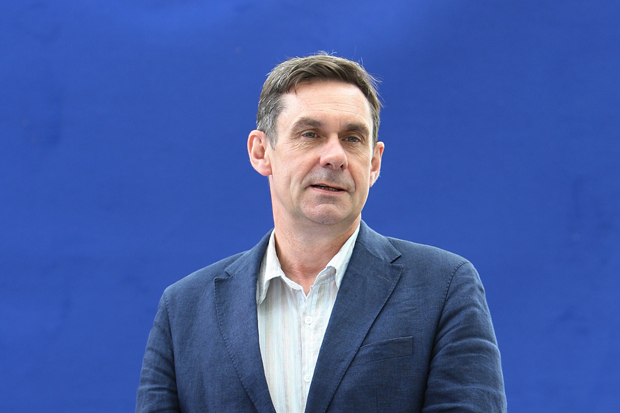It’ll be a Skype interview, says the producer from Greek television, and not live. In TV-speak that usually means not urgent and not important, but I’ve become vaguely interesting to Greeks because of the ‘Moscovici draft’ — a doomed attempt to resolve the crisis, leaked to me amid denials of its existence. The interview goes on a bit and the tone is deferential. At the appointed time, I fire up Greek television to see how many clips they’ve used. Instead of me, a panel of five bearded men in an expansive studio are conducting an earnest preview of my interview. When it starts, my face is on a studio screen twice the size of a human being and it turns out that Greek Skype is good enough to reveal what flavour of dog food you have smeared on your glasses and whether you have combed your hair. Afterwards, as the panel reconvenes, the words Πολ Μέισον (Paul Mason) begin to trend on Twitter. Some suggest a square in Athens be renamed after him. Others that he is a wanker.
Wednesday. I come off air and go straight to a fundraiser for a documentary my Greek colleagues are making about Syriza. For a news reporter, documentaries are the opposite of our daily reality. In the world of news coverage, doors open. In the world of documentary-making, they are slammed in your face. The audience is a mix of Syriza activists and bourgeois philhellenes, many of whom have never been to this part of London, an alley in Soho that runs beneath what used to be the Raymond Revuebar. The owner of the space is a Greek entrepreneur who has turned a former sex shop into an art gallery. ‘You should have seen what we had to clear out of here,’ he whispers. ‘I mean, I just don’t understand the British. The canes and stuff, OK, because of public school. But what would you want with a three-inch dildo?’
Friday. We head to Brussels on the Eurostar. Yanis Varoufakis, the flamboyant Greek finance minister, arrives without any staff. A panicked call from a Greek source explains why he doesn’t need anyone to help negotiate. The source mentions a figure for that day’s withdrawals from the banking system, which makes my face go the colour of a Brussels sprout. We are hours from the imposition of ATM withdrawal limits. While I’m figuring out what to do with information which, if tweeted, could spark a bank run, Varoufakis capitulates. At the press conference, I fire a terse question at Euro Group head Jeroen Dijsselbloem, along the lines of, ‘What do you say to the Greeks whose democracy you just trashed?’ He says my question is not very objective. I see what he means: the Brussels-based press pack tend to ask questions such as, ‘Can you just clarify what it means in paragraph 5.4?’ Towards midnight, I find Varoufakis in a tiny briefing room, packed with cameras and sweating hacks. He seems exhilarated and is extemporising about Ulysses being tied to the mast. When I try to ask a question, he does his Mr Spock look: ‘I haven’t finished, be patient, it is a virtue.’ He goes on for another 40 minutes: a cadenza of philosophy, economics and realpolitik. ‘Your finance minister is a bit weird,’ he tells one Greek journalist. ‘He tells the truth.’ But the truth is not final until it has been chewed over in the Hairy Canary, a Brussels institution as important as the Consilium. There, fuelled by pints of Timothy Taylor’s, those journalists still standing try to work out who won. Syriza have backed down, but they avoided a bank run and will probably remain in office to carry out all those non-fiscal policies which the finance tribe barely register.‘What would be the point of Syriza remaining in office after this?’ one City contact texts. ‘Have you ever seen a riot squad disbanded by a minister of the interior who is a professor of Marxist criminology?’ I reply.
Monday. The weekend has not been kind to Syriza. Its 92-year-old MEP Manolis Glezos has issued a call for open rebellion against the deal. Glezos is famous for having ripped down the swastika from the Acropolis in 1941. I am wondering whether this is big enough to mention on the news when the German embassy rings to say their deputy finance minister is offering to go on camera. Yes, please. I feel sorry for minister Steffen Kampeter’s generation of German technocrats. Before this surreal drama began, few can have expected to be answering questions in which the word swastika came up. He looks at his shoes briefly, then defends the rule of law. ‘But Glezos defied the rule of law in 1941,’ is the theme of 100 tweets when it is broadcast. On all sides, it’s a shabby time in the Eurozone.
The era of stable government is over
 Join us on 23 March for a Spectator discussion on whether the era of stable government is over with Matthew Parris, James Forsyth, Jeremy Browne MP, Vernon Bogdanor and Matthew Goodwin. The event will be chaired by Andrew Neil. In association with Seven Investment Management. For tickets and further information click here.
Join us on 23 March for a Spectator discussion on whether the era of stable government is over with Matthew Parris, James Forsyth, Jeremy Browne MP, Vernon Bogdanor and Matthew Goodwin. The event will be chaired by Andrew Neil. In association with Seven Investment Management. For tickets and further information click here.
Got something to add? Join the discussion and comment below.
Get 10 issues for just $10
Subscribe to The Spectator Australia today for the next 10 magazine issues, plus full online access, for just $10.
Paul Mason is economics editor of Channel 4 News and is producing the documentary Greece: Dreams Take Revenge.
You might disagree with half of it, but you’ll enjoy reading all of it. Try your first month for free, then just $2 a week for the remainder of your first year.














Comments
Don't miss out
Join the conversation with other Spectator Australia readers. Subscribe to leave a comment.
SUBSCRIBEAlready a subscriber? Log in